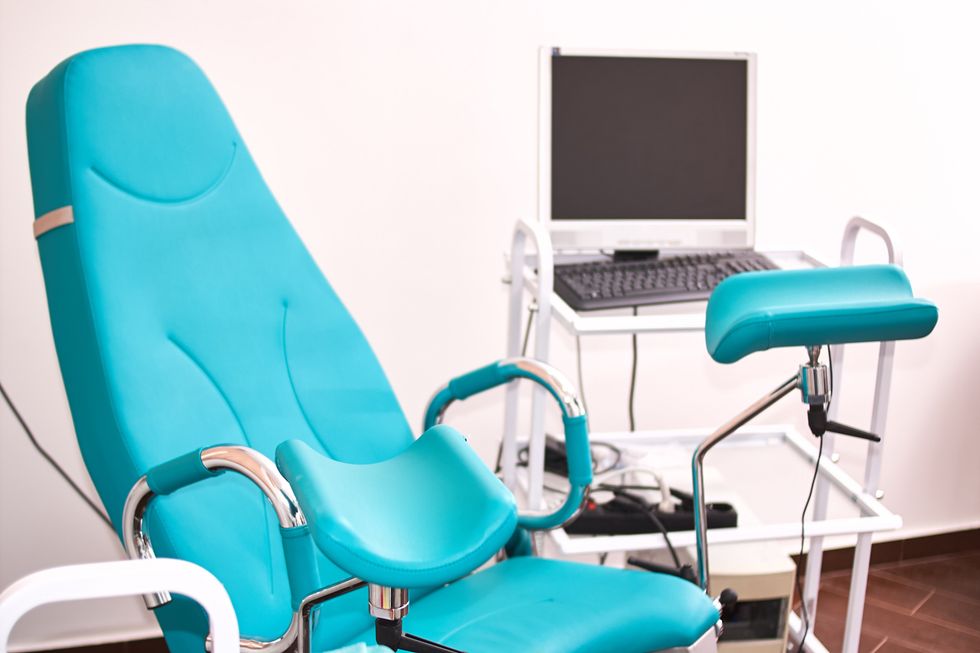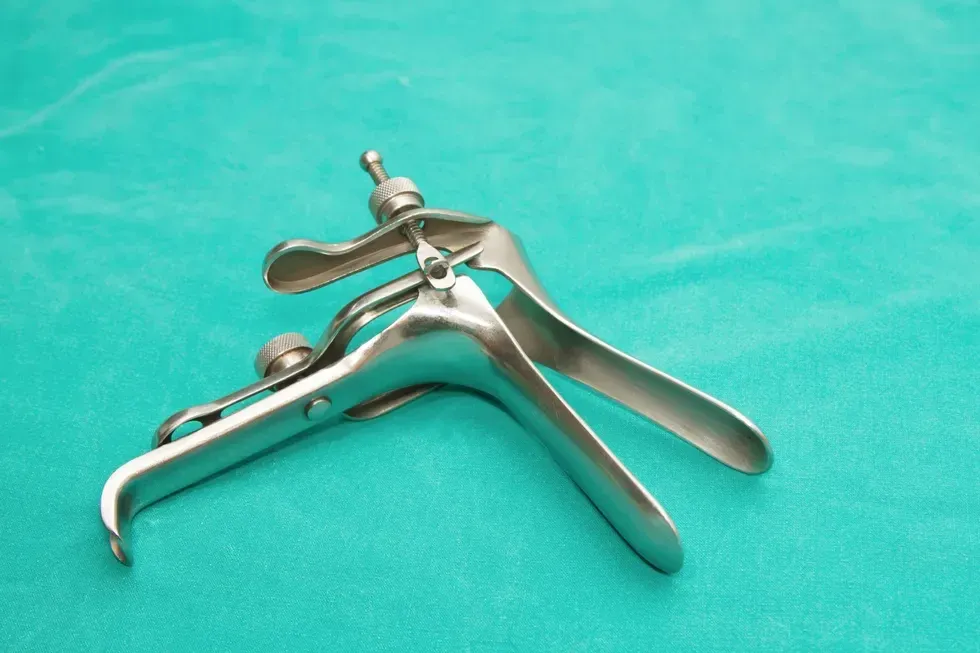
Getting a pap smear in Ontario can be intimidating – but it doesn't have to be.
We've all been there. You undress, slip on a medical gown, put your feet in a set of stirrups and scoot your butt down as far as it will go (but somehow, it's never far enough?) and get cozy with a speculum.
If that doesn't sound appealing, you're not alone, but getting a pap smear is a vital part of taking care of your health, and there are ways to make the experience more tolerable.
Narcity spoke with Ontario obstetrician and gynecologist Katrina Zefkic, who broke down everything you've ever wanted to know about getting a pap smear and how to make the experience more comfortable, from tips and tricks to finding the right doctor for you.
What is a pap smear?
A pap smear or papanicolaou test is a screening test for cervical cancer.
The test uses a "gentle brush to collect cells from the cervix to assess for abnormalities," according to Zefkic.
Although it is important to know that the procedure is a screening test and not diagnostic, so you won't find out if you have cervical cancer just from getting a pap smear.
Pap smears also provide information on any human papillomavirus (HPV) changes within your cells which are linked to cervical cancer, according to Zefkic.
"They can provide us information about the cellular health of the cervix and assess for any associated HPV changes within the cells," says Zefkic.
"Roughly 95% of cervical cancer globally is caused by HPV, but importantly this does not mean that everyone who has HPV will get cervical cancer."
HPV is a common sexually transmitted disease, and according to the Government of Canada, over 70 percent of sexually active Canadian adults will have a sexually transmitted HPV infection in their lives – so before you freak out, it's more common than you may think.
Most infections don't have any symptoms and go away on their own, but some can stick around.
To best avoid catching HPV, which is transmitted through skin-to-skin contact, you can prioritize using condoms with sexual partners and getting vaccinated against the virus.
What happens in a pap smear?

When you first check in for a pap smear, you can expect a little chit-chat, according to Zefkic.
Your doctor will ask you about your medical history, including HPV vaccinations, sexual orientation, sexual partners, use of contraceptives, pregnancies, and previous pap results.
After what may feel like an intrusive first date, your doctor should get consent from you to proceed with the exam.
You'll undress and usually lie down on a table where your doctor will lube up a plastic or metal speculum, insert it into your vagina, and open it to get a better look at your cervix.
From there, your health provider will take a pap brush and spin it around your cervix several times to gather up cells and then take it out and place it in a solution.
Afterwards, you can let out a breath as the speculum is removed, and the practitioner will examine your cervix, ovaries and uterus for masses with their fingers.
All in all, Zefkic says the exam should just take a couple of minutes.
If any abnormalities come back on your pap screening, you'll be sent for a colposcopy "to clarify the findings and prevent cancerous changes."
At what age should you start getting pap smears?
Cancer Care Ontario currently recommends that people with a cervix start getting pap smears at 21 years old, but Zefkic says they are currently remodelling this, and you may not need to get one until you are 25 years old.
"This was recently changed from 21 years old based on data that suggested the immune system in women younger than 25 years old will likely eradicate the HPV virus and that we may have been intervening too early and aggressively in these situations," says Zefkic.
So if you have a cervix and you're 25 or over, you may want to book in with your family doctor or a sexual clinic.
Once you start getting paps, you should get one every three years, but if you have HIV or any abnormalities, you may need to get checked out every six to twelve months, says Zefkic.
How do you book a pap smear in Ontario?

You can have a pap smear done at a family doctor's office or sexual clinic in Ontario, according to Zefkic.
"Simply put, call your family doctor or local sexual health clinic and ask for a pap. Very rarely do gynecologists see patients for only pap smears. Instead, we typically will deal with the management of abnormal paps that have been resulted and referred to us."
Why should you get a pap smear?
The big health benefit of getting a pap smear is preventing cervical cancer, which can get pretty gnarly, according to Zefkic.
"I cannot emphasize enough how awful the experience of cervical cancer can be. While a pap may be uncomfortable, it does not compare to the pain and challenges of cancer care. This is not to scare people but just to highlight the importance of preventative medicine," she says.
A pap smear only takes two to three minutes, so it's well worth the temporary discomfort for your long-term health.
Is it normal to be nervous about a pap smear?
Pap smears aren't comfortable on a good day, and it's normal to feel a little nervous about getting one.
Zefkic says paps can be particularly difficult for people who have had a bad experience with a prior provider or are just plain nervous to find out something may be wrong.
Sexual abuse survivors can also find this procedure triggering, according to Zefkic, who says they may avoid it altogether.
The gynecologist shared that even she had two bad pap smear experiences when she was young, where the provider was "aggressive and abrupt," which left her "weary" of future exams even though she was a budding OBGYN.
"I was always nervous during this procedure. Unfortunately, I know that some patients also share similar experiences to my own, and it's important to identify these to the provider doing your paps as it may help their approach," she explained.
Getting any medical results can be nerve-racking, and Zefkic says some patients are scared to potentially find out they have something wrong with them, even if it's treatable or benign.
"It's not a great reason to avoid having screening, but I also believe that as medical personnel, we need to do a better job speaking with the patient, addressing their concerns, and giving them a better understanding of what may happen."
How can you make your pap smear more comfortable?
Having anything inserted in your vagina while in a doctor's office is bound to be a little uncomfortable, but there are ways to ease the process along.
In her years of experience, Zefkic says the biggest tip she gives patients is to "keep the booty relaxed."
"One of the most important things the patient can do is allow their knees to flop to the side once in stirrups and relax their butt cheeks. These adjustments lessen the tension of the pelvic floor muscles, which means less pressure is required to entire the vagina with the speculum."
As someone who's been on the other side of the speculum, I'd also add that breathing slowly and deeply has helped me keep my muscles more relaxed throughout, and I always ask for a stress ball to squeeze.
If you have had a bad experience with a pap smear before, Zefkic recommends letting them know and asking for what you need during your procedure.
Whether that's asking your provider to talk you through the process or telling your provider what size of speculum has worked best for you in the past.
"I'm quite chatty, so I've gotten really good at talking to patients about other things and distracting them from the procedure, but I've also had people listen to music, and that's totally cool."
She also says that bringing in a family member or friend for support is totally okay, so feel free to lean on your support system.
This article's right-hand cover image was used for illustrative purposes only.
This interview has been condensed and edited for clarity.
Everything You've Ever Wanted To Know About Getting A Pap Smear In Ontario & Why It's Important
Source: News Article Viral


0 Comments